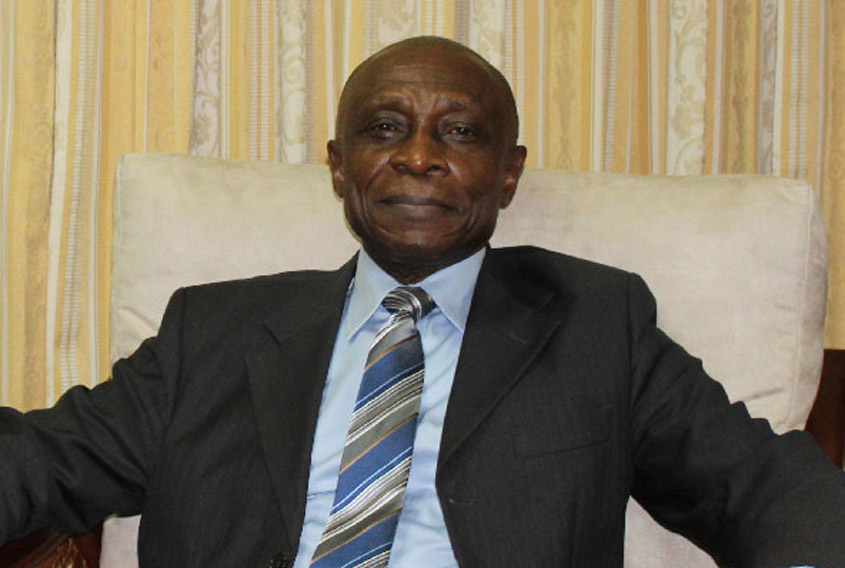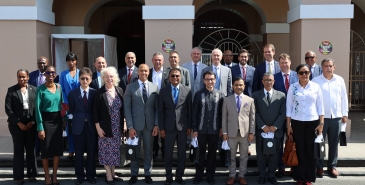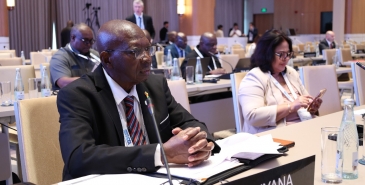Statement by Minister Carl Greenidge on Venezuela’s decree
Speech delivered at: 1st Sitting - Eleventh Parliament - 10 June, 2015

10 June, 2015
7853
On May 26, 2015, the President of Venezuela issued Decree No. 1.787 declaring an area that Venezuela now regards as its maritime space. The issuance of a Decree is well within President Maduro’s constitutional right.
What, Mr. Speaker, is not his right is to utilize the sovereign territory of the Cooperative Republic of Guyana to generate maritime territory to meet Venezuela’s illegal ambitions. That is precisely what the Decree purports to do in relation to Guyana’s Essequibo. In addition, it mandates and authorizes the Venezuelan Navy to secure the area and clearly to prevent any other State from exploiting, without Venezuela’s consent, the resources of the area, an area that now includes a significant portion of Guyana’s maritime space.
This Decree in its baseless and shameless attempt at usurping Guyana’s territory is also intended to deny Guyana its legitimate right to continue the pursuit of existing developmental initiatives. It is also intended to impact negatively on other pending and future developmental initiatives in that portion of Guyana’s legitimate maritime space that falls within the area circumscribed by the Decree.
Contrary to the Venezuelan Government’s public statements, the Decree cannot be considered an act of sovereignty where it applies to territory that does not belong to Venezuela. It flies in the face of all norms and principles of international law and it negates the very commitments assented to by Venezuela in numerous international and regional fora regarding the peaceful settlement of disputes. Guyana condemns this Decree in the strongest possible terms.
In a recent public release and in a Statement communicated to me by the Venezuelan Ambassador resident here, the Venezuelan Government is claiming that it has done nothing wrong in issuing the Decree. It asserts that over the years it has been very kindly disposed towards Guyana and indeed virtually accuses the Government of Guyana of over reacting. Let it be clear, however, that our response to what, from our perspective, can only be described as an act of territorial aggrandizement.
What then really is Venezuela’s intention in taking this illegal step? Mr. Speaker, please permit me to dilate momentarily on an aspect of our relations with Venezuela which has been a constant underlying theme and which puts in clear perspective what Guyana has had to face over the past almost 50 years. I will pass over the continuing illegal occupation of Guyana’s half of the island of Ankoko and the several unlawful incursions over those early years in thinly veiled attempts at claiming sovereignty over parts of the Essequibo region. I will make only passing reference to the many attempts at hindering development of this region, including Venezuela’s intervention seeking to prevent the implementation of the hydroelectric project in the Upper Mazaruni area and the pressure Venezuela has exerted at various times to discourage foreign investment in the region. All of these acts of military, para military and economic aggression have been well documented.
Instead, I shall fast forward to more recent times. Honourable Members will recall that in 2013 a Venezuelan naval vessel seized a seismic vessel conducting surveys in Guyana’s maritime space on behalf of Anadarko, a Company that had been granted exploration rights. The action created a climate of uncertainty among potential investors in Guyana’s maritime space. Exxon-Mobil is amongst the companies that continued to work on its concession area, in spite of the use of force by Venezuela against the Teknik Perdana. In fact, no reasonable observer could have possibly anticipated that Venezuela could ever regard the position where the Deep Water Champion is located as even remotely falling within the areas claimed by Venezuela. Clearly, as was revealed at the end of February, we all underestimated Venezuela’s appetite for territory. Decree No. 1.787 has confirmed.
Efforts at getting Venezuela to do the logical and reasonable thing, namely, sitting down to discuss the issue of maritime delimitation have to date proved futile. In this context it may be recalled that on September 30, 2011 my predecessor and her Venezuelan counterpart,
“recognized that the delimitation of the maritime boundaries between their two States remains an outstanding issue and agreed that such delimitation will require negotiations”.
Needless to say, such negotiations never took place despite Guyana’s best efforts to convene a meeting for this purpose.
In passing it is instructive to note that the Anadarko incident just referred to, occurred just a few months after President Maduro of Venezuela visited Guyana. In a Joint Declaration with President Ramotar they expressed their satisfaction with the result of their dialogue and welcomed its promise for the enhancement of relations between the two countries. On that same day, a group of Venezuelans accompanied by armed military personnel landed at Eteringbang. A few weeks later there was a similar occurrence by opposition Venezuelan legislators who indicated that their presence was part of an act of sovereignty!
Just last year as part of its development programme and in pursuit of initiatives already agreed to within UNASUR, Guyana and Brazil began a programme that involved, inter alia, the examination of hydropower development in parts of the Essequibo region. The Government of Venezuela, also a member of UNASUR, formally objected to this development and requested both the Brazilian Government and the Brazilian firm undertaking the feasibility studies to desist from carrying out any action in what the Venezuelan Government described as being ‘unquestionably Venezuelan territory’. A similar sentiment was communicated to Guyana. Venezuela insisted that its consent was required before any significant action could take place on Guyana’s territory! Those approaches and that insistence have been roundly rejected.
The Arbitral Award of 1899 definitively established the boundary between Guyana and Venezuela. It is clear that Venezuela, by the aforesaid actions, is no longer contending that the Arbitral Award of 1899 is null and void. The inescapable conclusion, and one which portents grave danger to regional and international peace and security, is that the Venezuelan Government has now elevated the contention of nullity and invalidity to an assertion of fact. The Decree implies that international norms and good practices are not applicable to Venezuela and, consequently, that the Decree with respect to the Essequibo region as well as the maritime space the region provides is ipso facto Venezuelan territory.
It is difficult for a dispassionate observer to determine what has propelled the Government of Venezuela to take this so patently illegal action – an action that flies in the face of all the norms and conventions that govern relations between States. Guyana has always sought the principled route in response to Venezuela’s persistent and continuing acts of aggression and will continue to do so. We have been in contact with several members of the international community and have made special approaches to other Member States of the Caribbean and of the Commonwealth from whom we have consistently received support in the past to our just cause. Other steps are being taken to ensure that Guyana’s sovereignty and territorial integrity are not compromised in any way and, that our sovereign right to develop this great country free from threats and acts of economic aggression remains untrammeled.
For 49 years we have lived in the shadow of Venezuela’s illegal claim and attempts to despoil our country. The sword of Damocles, for the most part unseen, nevertheless hangs over our heads. Unless removed, it will be the legacy that will be inherited by our children. It is time to end this cycle. A definitive solution has to be found that will put to rest Venezuela’s contention of nullity.
Venezuela has, by its recent Decree, virtually given notice that it intends to continue increasing the pressure on Guyana and to weaken our resistance to its illegal claim. We will not waiver in our resistance.
Apart from the diplomatic and related measures of resistance to which I have just alluded, there is also a legal instrument assented to by Guyana, the United Kingdom and Venezuela, which provides for the examination of Venezuela’s contention that the Arbitral Award of 1899 is null and void. It also provides mechanisms for the eventual settlement of that baseless contention. The Geneva Agreement of 1966 remains the best hope for keeping the issue between Guyana and Venezuela from going totally out of control. The mandate of the Secretary General of the United Nations under this Agreement is quite clear. It is very specific.
According to Article IV (2) … the Secretary General of the United Nations shall choose another of the means stipulated in Article 33 of the Charter of the United Nations, and so on until the controversy has been resolved or until all the means of peaceful settlement there contemplated have been exhausted.
For more than 25 years the Good Offices Process, as one of the chosen means of peaceful settlement, has been in operation. Unhappily, it has signally failed to resolve the issue. The Decree of 26 May, 2015, has served to widen even further the gap between Guyana and Venezuela.
Notwithstanding the fact that an International Boundary Settlement already exists in the form of the Arbitral Award of 1899, a juridical settlement in respect of Venezuela’s contention that this Award is null and void appears to be the best, if not the only way now open to us.
To that eventuality we must now direct our full attention. Guyana of course stands ready to continue discussions with Venezuela with respect to our bilateral relations while we pursue a peaceful settlement within the framework of the Geneva Agreement where the UN Secretary General has a defined role. (STATEMENT made on June 10, opening of Guyana’s 11th parliament).
Speech delivered by:
What's New

16 April, 2025
Speaker of the National Assembly Hosts Luncheon and Tour of Public Buildings for Diplomats

08 April, 2025
Minister Kwame McCoy promotes Low Carbon Development Strategy in IPU Committee Meeting on Sustainable Development

07 April, 2025
Speaker Nadir Emphasises Guyana’s Commitment to Social Development at IPU General Debate

07 April, 2025
Clerk of the National Assembly Attends ASGP Plenary Meetings during the 150th IPU Assembly in Tashkent, Uzbekistan

